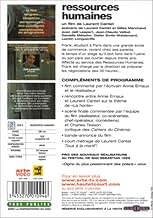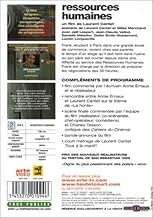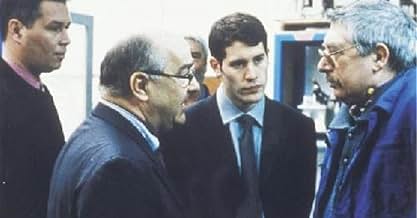Ressources humaines
- 1999
- Tous publics
- 1h 40min
Ajouter une intrigue dans votre langueThe 35-hour work week has all of France in its thrall. This film turns it into a feature about economic and familial politics. Frank, a business school graduate, returns to his provincial ho... Tout lireThe 35-hour work week has all of France in its thrall. This film turns it into a feature about economic and familial politics. Frank, a business school graduate, returns to his provincial hometown to take a management position in the factory where his father has been working for ... Tout lireThe 35-hour work week has all of France in its thrall. This film turns it into a feature about economic and familial politics. Frank, a business school graduate, returns to his provincial hometown to take a management position in the factory where his father has been working for 30 years. First Frank makes the mistake of actually asking the workers on the assembly lin... Tout lire
- Réalisation
- Scénario
- Casting principal
- Récompenses
- 19 victoires et 5 nominations au total
- Alain
- (as Didier Emile-Woldemard)
Avis à la une
Franck (Jalil Lespert) is going to be graduating soon from college. So, for his internship, he returns to the factory where his dad has long worked and Franck's job is in the front office...with management. He has arrived at an interesting time, as the relationship between the owners and the workers are deadlocked. The boss insists he's got the workers' best interests at heart and the communist labor leader simply wants nothing to do with him and her position is purely adversarial. Most viewers likely will assume this labor leader is an extremist...and it sure looks that way. Franck decides to try appealing directly to the workers...and he's wildly successful. What he doesn't know is that the boss really IS a duplicitous creep and he's using Franck. So what will Franck do when he learns the truth?
This film is a tough sell for many viewers. A film about labor and management is NOT a sexy or exciting idea for most viewers. It also is very slow at times and features a direct-to-video look. Still, despite all this, it is a powerful and well acted film that gets you to think.
Laurent Cantet's first film, Human Resources, shows the dehumanizing effect of mechanical labor on the relationship between a father and his son in rural France. The film has a strong political message but never feels sterile or preachy; rather it is a deeply felt human drama about class mobility. Jalil Lespert, the only professional actor in the cast, is Franck Verdeau, a young, handsome intern who works for the same company in which his father (Jean-Claude Vallod) has toiled for thirty years. Mr. Verdeau is a heavy-set taciturn individual who operates an automatic welding device that forces him to stand on his feet all day, bent over his machine and proudly claims that he can churn out 700 parts per hour. A member of the old school who does not believe in upsetting the bosses, the father is more compliant than most workers who still operate within the system but express their misgivings in union activity.
Franck has just returned home from school in Paris. Eager to seize upon the opportunity presented to him through his father's sacrifice, he seeks to impress management and launch his career by assessing the validity of instituting a 35-hour workweek. Although he has made a good first impression on his shrewd boss (Lucien Longueville), he soon comes into conflict with union leaders who are fearful that reducing the amount of hours will lead to automation and loss of jobs. Torn between his professional obligations and his sympathies for the workers, Franck naively proposes a referendum of the workers on the issue. This plays into the hands of management seeking to drive a wedge between the workers and their union, led by firebrand activist, Danielle Arnoux (Danielle Melador).
Arnoux, a real-life left-wing union activist, is an aggressive and uncompromising leader who does not hesitate to let management know exactly where she stands. When more layoffs seem to be forecast including that of his own father, Franck must choose sides between the militants and the father who made his job and career possible. Mr. Verdeau is opposed to the union and cannot see any benefit from a staggered workweek that would mean increased leisure. Their final confrontation about the father's passivity brings to the surface resentments about his father's social class that have been repressed for many years.
Human Resources is shot inside an actual factory, creating an authenticity furthered by its cast of actual factory employees. I found myself deeply involved with the characters. In tackling an issue that Hollywood has stayed miles away from, Cantet has made us aware of the daily drudgery of millions of people around the world for whom compromise and submission is a way of life. The film never loses his focus, striking a balance between social relevance and a character study of deeply conflicted individuals whose work is reflected in their self-image. Cantet said in an interview, "The title Human Resources is a reaction against the cynicism of that expression. A human being is administered the same way you would administer stocks or capital. I wanted to play on that double meaning and go beyond coded administrative lingo in order to talk about an actual human's resources." He has succeeded impressively.
There is a naturalness about the location, the setting and the pace that makes this film a refreshing change from Hollywood High Tech. It is well worth seeing.
Le saviez-vous
- AnecdotesSame script structure as Oliver Stone's "Wall Street".
- Bandes originalesQuatuor N°13 en la mineur
Composed by Franz Schubert
Performed by Melos Quartett (as Melos Quartet)
Published by Harmonia Mundi
Meilleurs choix
Détails
- Date de sortie
- Pays d’origine
- Site officiel
- Langue
- Aussi connu sous le nom de
- Human Resources
- Lieux de tournage
- Sociétés de production
- Voir plus de crédits d'entreprise sur IMDbPro
Box-office
- Montant brut aux États-Unis et au Canada
- 116 866 $US
- Week-end de sortie aux États-Unis et au Canada
- 29 526 $US
- 17 sept. 2000






















